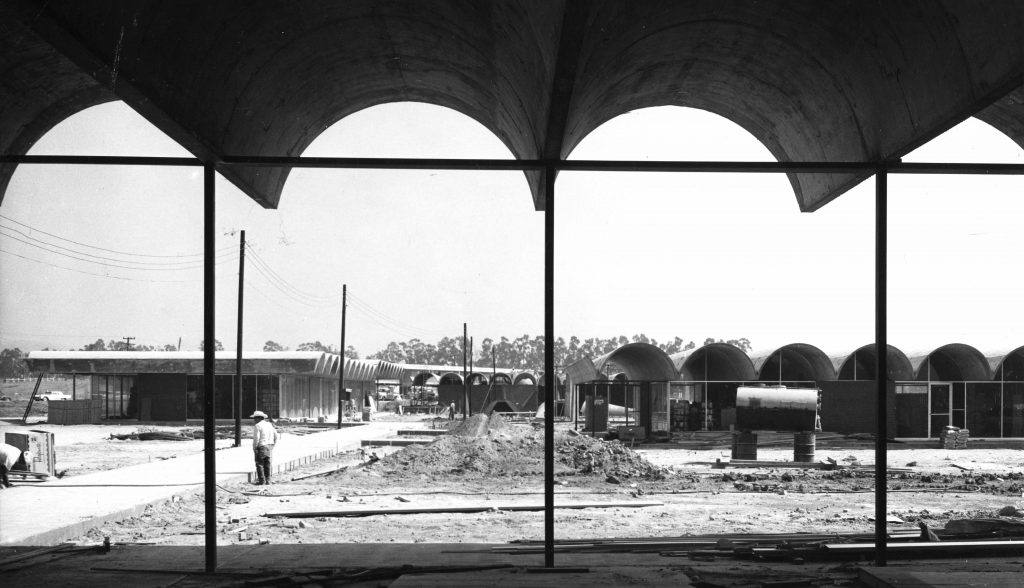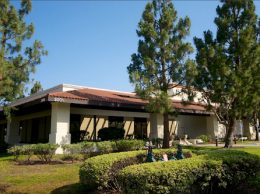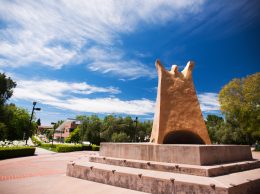
The view from inside the California Lutheran University administration building toward a campus under construction in the 1960s.
On an impromptu visit to the former library that currently hosts KidSTREAM, a planned science museum for children in Camarillo, something clicked.
As I stood in the main hall of the empty reading room, the vaulted ceiling, streaming natural lighting and built-in alcoves all worked as a unitary design. The fanciful pattern on the iron entrance gates reminded me of modernism masterpieces I had seen in Palm Springs. All that was missing were some carrels and bean bag chairs.
Helpful librarians and curators at the Museum of Ventura County solved the mystery. The architect of the 1974 structure at 3100 Ponderosa Drive was Jefferson A. Elmendorf (1926-2011), an architect with a flair for modernism who left a big mark on Ventura County.
After graduating from the University of Southern California and working in Los Angeles, Elmendorf set up a studio in a chicken coop on the campus of California Lutheran University, where he designed its iconic Centrum building as well as the administration building with its concrete barrel roof.
He later designed dozens of buildings from Calabasas to Camarillo. One of the people who remembers him is attorney Chuck Cohen, a former mayor of Thousand Oaks.
“Jeff Elmendorf was the premier architect in the Conejo Valley in the early days of the awakening of East Ventura County,” he wrote me in an email. He cited Elmendorf’s work with former CLU President Raymond Olson in creating a campus for the county’s first university.
Elmendorf’s design for the library was commissioned by Ventura County, which operated the library until it was replaced by a new building in 2007. A newspaper clipping from the building’s dedication in 1974 says it cost $808,406 and had a capacity of 75,000 volumes. The original décor included those missing bean bag chairs as well as gold carpeting.
Today, the building is owned by the city of Camarillo, which took over in 2011 when Camarillo left the county library system. KidSTREAM is hosting pop-up events and planning a capital campaign to give the Elmendorf design a second life as a museum for young children.
Project Manager Sean Leonard said in an email that the “bones of the building are still in good condition.” Museum architects Cambridge Seven and area firm Behr Bowers have agreed that the redesign should “preserve the high vaulted ceilings and large gathering space” to create a “unique ideal space” for a children’s museum, he added.
“The open interiors that are common in Jefferson Elmendorf’s designs are ideal for a children’s museum and will allow for fun, interactive, educational play,” said Holly Cole, KidSTREAM’s vice president, in an email.
An entry for Elmendorf in the American Institute of Architects’ annual directory lists a number of Lutheran churches, church-affiliated educational buildings and medical offices among his works. He was active in the Thousand Oaks Rotary and was a well-known figure in the community, recalled Cohen.
The Elmendorf era in Ventura County came to an end in 1978 when he and his wife, Lynda, a CLU graduate, moved to Spain to join their daughter Chandra. They lived in Europe until 2000 when they returned to California. He died in Frazier Park in 2011, and his obituary memorializes many of his works, his community spirit and his devotion to “his family and his lord.”
The discovery of Elmendorf and his legacy came at a propitious time. It turns out that 2019 marks the centennial of the Bauhaus, the design school founded by Walter Gropius in Germany that gave birth to the movement later known as modernism.
Whether it was the German roots of modernism that excited Elemendorf, a practicing Lutheran, or the education he received at USC, which turned out a number of modernism masters, we’ll likely never know. But the region is richer for his contributions.
• Contact Henry Dubroff at hdubroff@pacbiztimes.com.
Modernism in the Tri-Counties
The discovery of Elmendorf’s legacy and the 100th anniversary of the Bauhaus led me to create a mini-tour of modernism icons in the region.
• California Lutheran University: Not to be missed are Elmendorf’s easily accessible Centrum and administration buildings on the campus of California Lutheran University. The buildings were notable for their large, open, well-lighted spaces that were futuristic and functional, according to a 2012 article in CLU Magazine. The buildings are one of the featured stops in the mid-century modern chapter on the website Roadside Architecture.
• Eichler homes: There is a well-known group of homes by California designer Joseph Eichler, just off Lynn Road in Thousand Oaks, that are definitely worth a drive by.
• Coral Casino Beach and Cabana Club: For an example of pre-World War II modernism, it’s hard to beat the Coral Casino Beach and Cabana Club at the Four Seasons Biltmore Santa Barbara. The 1937 structure was designed by San Francisco architect Gardiner Dailey, and it was meant to contrast with but also complement the classic Santa Barbara style of the resort itself. Owner Ty Warner painstakingly restored the historic building in 2008.
• Faculty Club at UC Santa Barbara: The UCSB faculty club has been a modernism icon since it opened in 1968. It was designed by the Bay Area firm of Moore, Lyndon, Turnbull, and Whitaker, led by Charles Moore and William Turnbull, two masters of modernism. Some of their work was the subject of a Modernism Week lecture in Palm Springs this winter. The playful building at UCSB recently got an $11 million renovation.
• Chromatic gate: Recognizing the Bauhaus centennial would not be complete without a mention of Herbert Bayer’s chromatic gate on Cabrillo Boulevard in Santa Barbara near the Hilton Beachfront Resort. Bayer, born in Austria, was a member of the Bauhaus. He fled Germany in 1938. He worked in design and sculpture and developed collections for a number of corporations, including Arco. He moved to Montecito in 1975, and his iconic gate was not completed until 1991, six years after his death. The gate was restored several years ago.






 Print
Print Email
Email

















